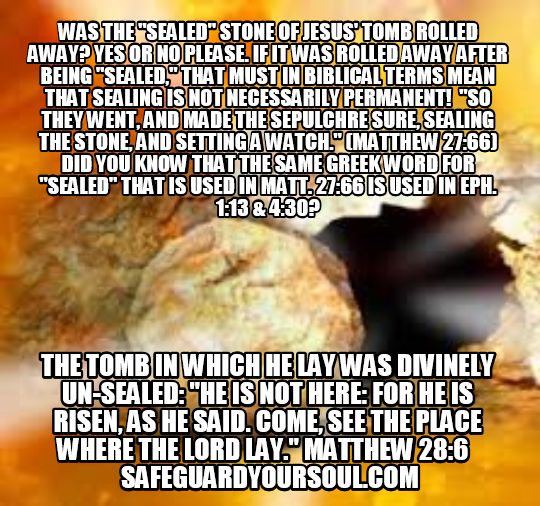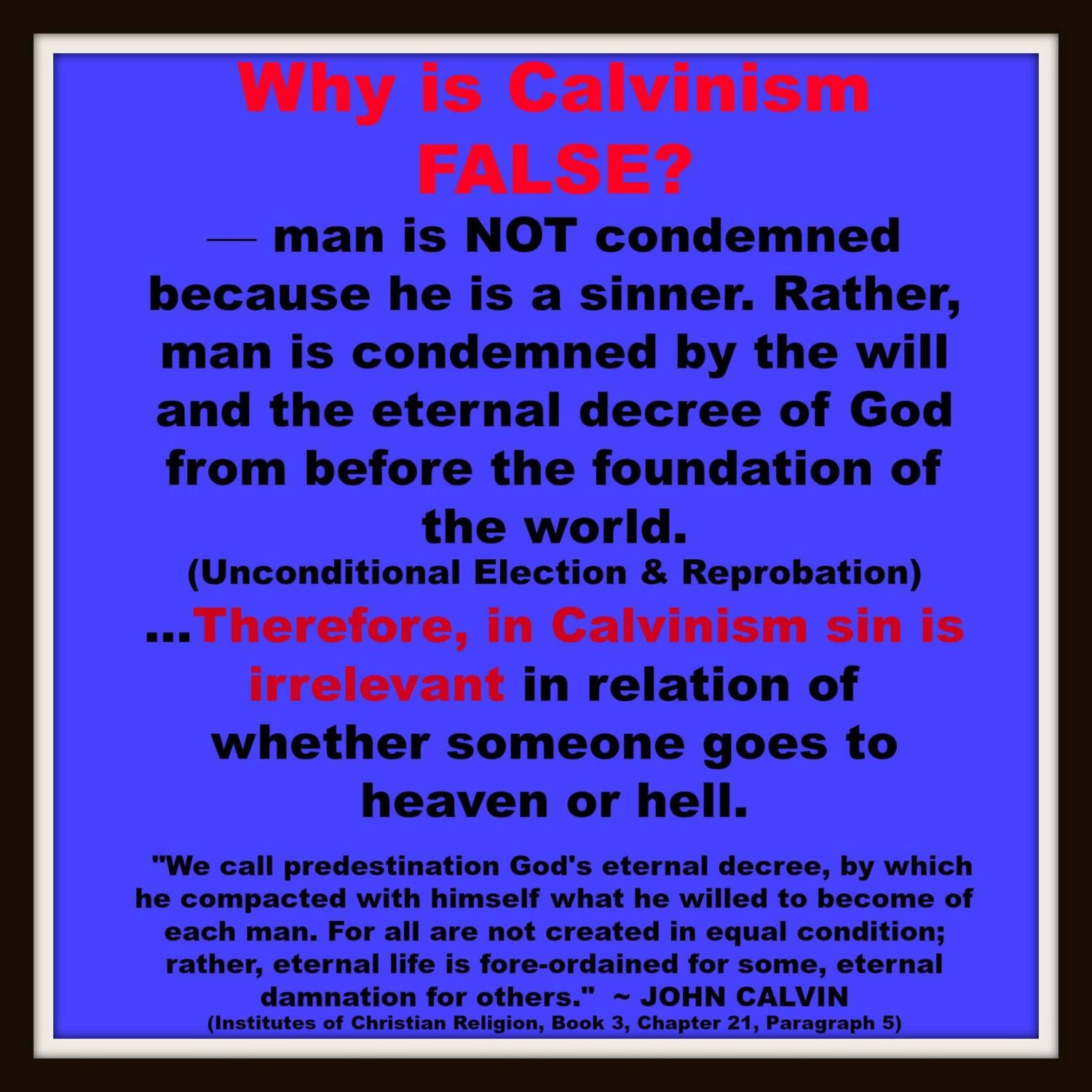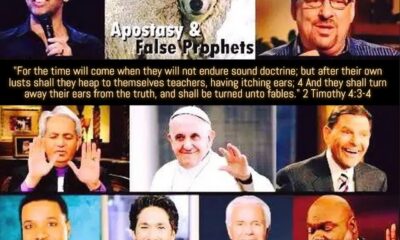
“Sealed unto the Day of Redemption” Ephesians 4:30 [podcast]
Salvation Sealed or Doom Sealed?
Sealed: WHAT does that mean and what does it not mean?
Beware of the false definition of sealed by dispensationalist heretics.
Cross-less moral cowards never cease to look for new ways to twist Scripture to justify their rebellion – to excuse themselves from personal responsibility and accountability to Christ. They are “enemies of the cross.” (Philippians 3:18-19) They want to crown but refuse the cross that Jesus says is essential to following Him (Luke 9:23-24).
The sealed counterfeits simply want the guarantee that they are going to Heaven no matter what. They don’t want anything to do with that bless-ed cross Jesus commanded to be taken up daily (Luke 9:23-24).
Sealed Pushers Smashed! When Ephesians uses the word “sealed”, does that mean the seal cannot be broken? Let’s take a look.
Excerpt from the book Lie of the Ages
The Bible never says that “sealed” means un-sealable. Let’s explore.
When God’s Word uses the word “sealed” what does that really mean? What does it not mean?
No one said anyone saves themselves and yet the only One who can save requires that one repent and believe on Him for initial salvation AND also abide/remain/continue with Him to the end or perish (John 15:5; Luke 8:13, etc.). OSAS is a lie. Not biblical. It’s the cross-less counterfeits who balk at the divine truth that salvation is conditional and not un-conditional. What does “sealed” really mean as opposed to how it’s been misrepresented? SEALED? ARE YOU SURE?
BEWARE OF THE SEALED SCAM PUSHED BY “ETERNAL SECURITY” HERETICS: We are sealed but what does that really mean and what does it not mean? Jesus’ tomb was sealed, right? Are you saying He wasn’t raised from the dead because that seal couldn’t be un-sealed? Matthew 27:66 – SAME Greek word as sealed in Ephesians.
Just another lie to evade the cross, to evade all personal responsibility. Jude 3-4 in play.
Define “sealed” from Ephesians … same Greek word as Matthew 27:66 where Jesus’ tomb was sealed and yet it was UN-sealed when He raised from the dead. So, “sealed” is not an unbreakable seal. To seal simply means to stamp.
One writer notes:
“Seal was not a lock that could not be opened; it was a mark of ownership, such as would be placed on a document.”
“Sealed” is not un-sealable. It cannot possibly mean that once one is “sealed” that the seal cannot be broken as is often taught by today’s “ungodly men” who are “turning the grace of our God into lasciviousness, and denying the only Lord God, and our Lord Jesus Christ.” (Jude 4) “Sealed” in Ephesians is the same Greek word used in Matthew 27:66.
“So they went, and made the sepulchre sure, SEALING the stone, and setting a watch. … he is risen from the dead …” Matthew 27:66; 28:7
Case closed.
“And if Christ be not raised, your faith is vain; ye are yet in your sins.” 1 Corinthians 15:17
 Have you opened a sealed envelope lately? You’ve been duped to believe that “sealed” in the Bible means that the seal cannot be undone. YET, the same Greek word is used in Matthew 27:66 when it says Jesus’ tomb was “sealed.” Was that seal broken? Yes, and Jesus was raised from dead without which no one can be saved.
Have you opened a sealed envelope lately? You’ve been duped to believe that “sealed” in the Bible means that the seal cannot be undone. YET, the same Greek word is used in Matthew 27:66 when it says Jesus’ tomb was “sealed.” Was that seal broken? Yes, and Jesus was raised from dead without which no one can be saved.
The Bible word “sealed” has been completely redefined by false teachers to attempt to prove Satan’s OSAS lie. What does “sealed” really mean? Can a seal be broken? Yes it can – Jesus’ tomb was sealed and we know that seal was broken when He rose from the dead (Matthew 27:66). False teachers have redefined the Bible word “sealed“…. and are misleading others. Let’s peer into the text a bit.
The Bridegroom and His Bride
Throughout Scripture, God depicts His relationship with His people using the bride and bridegroom relationship (2 Corinthians 11:2; Ephesians 5:25-30; Revelation 19:7-10).
“In whom ye also trusted, after that ye heard the word of truth, the gospel of your salvation: in whom also after that ye believed, ye were sealed with that holy Spirit of promise, 14 Which is the earnest (down payment) of our inheritance UNTIL the redemption of the purchased possession, unto the praise of his glory.” Ephesians 1:13-14
“ye were sealed with that holy Spirit of promise” which means “marked by first installment, down payment.”
The sealing the LORD puts on His people is “the earnest” or down payment “of our inheritance UNTIL the redemption of the purchased possession.” The Greek word for “earnest” here is arrhabōn and speaks of a “down payment” or “a pledge, that is, part of the purchase money or property given in advance as security for the rest: – earnest.” This “earnest” or down payment by God in purchasing us into “our inheritance” with Him in contingent upon the conclusion of the transaction which will culminate at “the marriage supper of the Lamb.” (Revelation 19:9) The down payment as been paid and probation is in place until “the redemption of the purchased possession” consummates. Scripture says that we are “espoused” or engaged to Christ and not yet married to Him. The down payment has been paid for us by the blood of the Son of God. Yet down payments do not always result in finalized deals. Many who put or pay down payment money for homes, do not ultimately take possession of those homes. Such requires conditions to be met by both parties.
“For I am jealous over you with godly jealousy: for I have espoused (engaged) you to one husband, that I may present you as a chaste virgin to Christ.” 2 Corinthians 11:2
God’s intention is to bring each of those He’s “espoused” into the bridal chamber of the New Jerusalem to be forever with Him (Revelation 21). Yet as Christ the Bridegroom taught in His parable of the 10 virgins, each to whom He was espoused, only 5 of them made it to the wedding the marriage (Matthew 25:1-13). We have abundance of evidence in Holy Scripture that of those “espoused” to be married to the LORD, “some shall depart from the faith” and therefore forfeit, will not make it to the marriage (1 Timothy 4:1).
FACTS:
- The Bible never states that everyone Jesus ever saved is automatically going to Heaven. If the conditions aren’t met between the periods of the engagement (espousal) and the wedding, the marriage is called off, canceled (Matthew 25:1-13; Ephesians 5:25-30; 1 Peter 4:18; Revelation 19:7-10, etc.).
- The words “eternal security” or “once saved always saved” never once appear in Scripture – in word or on content/context – other than in concept and taught by Satan and His false prophets (Genesis 2:17; 3:4; Jeremiah 23:17; Jude 4, etc.).
- Jesus and His holy apostles taught that it is essential for the saved – those engaged to Christ – to “endure to the end” (Matthew 10:22; 24:13; Colossians 1:23; Hebrews 3:6, 12-14; 10:26-39), to remain in Christ or He will “cast them into the fire, and they are burned.” (John 15:6), to continue in “the goodness and severity of God” or be “cut off” (Romans 11:20-22).
- Jesus and His apostles taught that it were better never have to have been saved than to “turn from the holy commandment (Word) of God.” (2 Peter 2:20-22)
- Peter said that the eternal, conscious sufferings of those who die in sin after having been saved is “worse with them than the beginning.” (2 Peter 2:20-22)
- Jesus taught that in order to be in Heaven with Him, after being saved, one must “cut off the hand” and pluck out the eye of any sinful offence or suffer being eternally cast “into the fire that never shall be quenched: 44 Where their worm (consciousness) dieth not, and the fire is not quenched.” (Mark 9:43-49)
- The eternal punishment for those who were saved and then turn away from Christ will have “trodden under foot the Son of God, and hath counted the blood of the covenant, wherewith he was sanctified, an unholy thing, and hath done despite unto the Spirit of grace?” (Hebrews 10:29)
- Jesus taught those that were His that they must “endure to the end” to be ultimately “saved” into glory with Him (Matthew 10:22; 24:13; Revelation 2-3, etc.). Throughout Scripture, initial and final salvation are taught which is in contrast with the “one and done” eternal security doctrine of devils.
Back to the “earnest” or down payment whereby Christ’s saints are “sealed” or stamped. Yet such a sealing is a marking, as in marked for glory and yet such in no way or respect negates the responsibility of each party to meet the conditions to be ultimately married. Espousal, being engaged is not marriage – it’s only intended to result in marriage – yet, only if both parties show good fidelity. Infidelity breaks covenants (Jeremiah 3:8; Matthew 5:32, etc.).
When there is an engagement, an espousal between two parties, with the agreement to be married, there is an intentioned, an intended wedding and coming together under one roof on the horizon. Yet, the espousal can and is broken off when there is an unammended violation of one of the parties. In the espousal period there are conditions to be met – which if not met will result in the wedding and marriage being called off.
Greek for
ἀῤῥαβών
arrhabōn
ar-hrab-ohn’
Of Hebrew origin [H6162]; a pledge, that is, part of the purchase money or property given in advance as security for the rest: – earnest.
Total KJV occurrences: 3
What does “sealed” really mean?
Why do deceivers continue to impose false definitions on Scripture other than that they are a cross-less “ungodly men” who refuse to die to self and so are constantly looking to make excuses for their sin instead of truly trusting God to grant them His grace to overcome it? (See Philippians 3:18-19.)
“If you don’t believe that you can live in victory over sin, you’d better cross omnipotence off your calendar.” – Leonard Ravenhill
It’s interesting how these wolves tout the grace of God as if it’s a license to sin and automatically covers all their sin without their personal engagement, involvement. Yet they have NO faith in the grace of God to grant them power over sin through the crucified life (Romans 6:3-14). Are we beginning to see why they push this perverted definition of grace?
To a man who said that those who are born again are sealed and they cannot possibly lose their salvation, the following response was given:
Not true. SEALED cannot possibly mean that the seal is unbreakable. You’ve followed false teachings. JESUS’ tomb was unsealed (Matthew 27:66) and He was raised from the dead. It’s the same Greek word as “sealed” Ephesians 1:13; 4:30. Case closed. Jesus’ tomb was sealed then unsealed and He was raised from the dead. Anyone who doesn’t believe Jesus rose again is not saved (1 Corinthians 15:17). OSAS/eternal security is a lie from hell.
We see yet again in Revelation that a “seal” in God’s Word is never defined as something that is automatically permanent.
“And cast him into the bottomless pit, and shut him up, and set a seal upon him, that he should deceive the nations no more, till the thousand years should be fulfilled: and after that he must be loosed a little season.” Revelation 20:3
In the verse above, we see that Satan will be cast into the bottomless pit and a “seal” will be set upon him for a thousands years and then that pit will be unsealed to release the Devil.
Steven Marandola notes: “Seals are broken all throughout the Bible…the Holy Spirit is the seal but one can quench the Spirit after willful unrepented sin (Ephesians 4:30). Every official letter in those days had a seal that was meant to be broken.”
Grieving the Holy Spirit after being sealed is possible, otherwise there’d be no warning of such (Ephesians 4:30).
It’s just one more example of how we know that no honest sane person believes OSAS. It’s just another example of deceit and dishonesty to deny personal responsibility in obeying Jesus (Matthew 7:21). It’s ALL about THEM, totally self-serving and they could care less about knowing and obeying the Savior they claim as LORD and yet deny Him the honor of truly knowing, serving, worshipping, and obeying Him. Paul says they are “abominable” (Titus 1:16).
IF A SEAL IS PERMANENT JESUS COULD NOT HAVE RESURRECTED FROM THE DEAD BECAUSE THE SAME EXACT GREEK WORD IS USED IN MATTHEW 27:66 CONCERNING HIS SEALED TOMB AS IS IN EPHESIANS 1:13 AND 4:30.
The OSAS false teachers are always seeking to find yet another way to prove their father Satan’s first lie. They are constantly grasping for straws.
The attempt of eternal securists to make the definition of “sealed” confirm their lie, is pitifully weak and completely fraudulent. Heresy. Foolishness. Sealing in the Bible does not mean permanence. It’s typical scam theology attempting to fortify a lie.
Some will say “but how can one become un-sealed after being saved and sealed?”
Simple: The question is not whether you can become un-sealed – that’s a moral coward approach. The question is WHO ever said the Bible definition of “sealed” meant that seal can’t possibly be broken? The same exact Greek word for sealed is used concerning Christ’s tomb which we all know was UN-sealed (Matthew 27:66). So “sealed” in Ephesians can’t possibly mean that the seal is unbreakable.
Don Deskins writes: “The Bible shows that guaranteed eternal security does not come on earth and that the essence of the seal is the name written in the Book of Life or the broken seal being the name blotted out of that book.”
To say that something SEALED can’t be un-sealed is to say that JESUS DID NOT RISE FROM THE DEAD! (Matthew 27:66)
Though so many wish it were true, there is no guaranteed eternal position with God until you are actually with Him, because you are responsible to “endure to the end,” to “abide”/remain in intimate relationship with Christ, or you will be thrown into the fires of hell (Matthew 10:22; 24:13; John 15:6). Those who believe they are un-conditionally eternally secure are following false teaching. he fact that Jesus’ tomb was unsealed clearly establishes that something sealed CAN be unsealed.
“In whom also we have obtained an inheritance, being predestinated according to the purpose of him who worketh all things after the counsel of his own will: That we should be to the praise of his glory, who first trusted in Christ. In whom ye also trusted, after that ye heard the word of truth, the gospel of your salvation: in whom also after that ye believed, ye were sealed with that holy Spirit of promise, Which is the earnest of our inheritance until the redemption of the purchased possession, unto the praise of his glory.” Ephesians 1:11-14
One will find that the “sealed” teaching is prevalent among those who participate in and seek to justify the perversion of the grace of God using His very words, just as Jude warned us (Jude 4). Their teaching on being “sealed” is quite the occasion to privately interpret, twist and misuse the Scriptures. Those who are “turning the grace of our God into lasciviousness” find much opportunity to exaggerate what the Bible states and does not state about being “sealed with that Holy Spirit.” Upon a closer, more thorough and sober look at the word “sealed” and in the context it is written, and of the whole of the Word of God, quite a different perspective should emerge.
Counterfeits hunt high and low, far and wide to find Scripture they think they can use to justify not taking up the cross – living the crucified life. And, they run from, they avoid any Scripture that calls them to truly repent, to lay down their life in this fleeting world, deny self, take up the cross and follow Jesus for real. Hell awaits.
It’s interesting how these wolves tout the grace of God as if it’s a license to sin and automatically covers all their sin without their involvement. Yet they have NO faith in the grace of God to grant them power over sin through the crucified life (Romans 6:3-14). Are we beginning to see why they push this perverted definition of grace?
Notice those who try to use the 2 “sealed” Scriptures in Ephesians don’t even want to know about this Bible verse below which gives definition to those who are truly “sealed” – as in they “depart from iniquity” instead of making excuse for it, instead of hiding behind sin-justifying false doctrine.
Joseph Gorscak writes: “Put it together people: ‘Nevertheless the foundation of God standeth sure, having this seal, The Lord knoweth them that are his. And, Let every one that nameth the name of Christ depart from iniquity.'” (2 Timothy 2:19)
Note in Ephesians 1 the Holy Spirit is speaking of those who have “obtained an inheritance, being predestinated according to the purpose of him who worketh all things after the counsel of his own will” or word. His Word is His will and the fullness of His recorded Counsel reveals that the Almighty beforehand destined (predestined) that all be saved and live according to His truth and holiness. Yet, He never forces any person to believe or obey Him. Is it not the “purpose” of God and the way that has been predestined and not the person? The LORD told us clearly that He wills all to be saved and come to repentance and that none (not one) should perish in hell (1 Tim. 2:4; 2 Pet. 3:9). In light of this fact of Scripture, we know the LORD would not choose some to be saved and some to be lost. According to His own Word, He clearly has not predestined some to go to Heaven and some to hell. God so loved the “whole world” that He gave His only begotten Son to pay the full price for the sins of all of mankind – not just some (Jn. 3:16; 1 Jn. 2:2). Only those who appropriate His gift of eternal life through Jesus Christ, by meeting the conditions He set forth, will spend eternity with Him and His family in Heaven (Isa. 1:19-20; Jn. 1:12; Col. 1:23; Heb. 3:12-15; 10:26-39; Rev. 2-3).
“For the grace of God that bringeth salvation hath appeared to ALL men.” Titus 2:11
“Sealed” comes from the Greek word sphragizo which is defined this way: to stamp with a signet or private mark for security or preservation. (Lit. or fig.) by implication. To keep secret, to attest: – seal up, stop.
A seal can be broken. A sealed envelope can be opened. It is conditionally sealed. This Greek word, sphragizo, is the same word translated “sealing” concerning the tomb in which Christ was laid after He died on the cross for the sins of the world.
“So they went, and made the sepulchre sure, SEALING the stone, and setting a watch.” Matthew 27:66
Christ’s tomb was sealed and we all know that the seal of Jesus’ tomb was broken, and He rose again. It was not a permanent bond that could not be broken just as the sealing work of the Spirit of God in the believer is not necessarily a permanent bond. The LORD wants it to be, yet will not force any saved person to continue to meet the conditions to be ultimately saved into His holy presence.
The seal of Jesus’ tomb was broken and so we know that the seal spoken of in Ephesians cannot possibly mean unbreakable.
As it is that the Father in Heaven alone could have broken the seal and raised Christ from the dead, so only God can break the seal He has formed. From His Word we learn that He will break the seal and loose the person who was once saved from His kingdom, if that person departs from the faith (Ezek. 33:12 -13; Acts 1:25; Gal. 5:19-21; Rev. 2:5; 3:16).
SEALED? Phil Kassees writes:
“Do not break the seal of your salvation thus becoming reprobate (fitted for destruction). There will be many that at one time who walked with the Lord, fell from grace and shipwrecked their faith. It’s not only that someone has come to the Lord at one time, but that they continue to abide in Him for all time.”
From the whole of Scripture, we can conclude that it is the divine intention that the subject be sealed all the way until the day of redemption and yet no individual’s free will has been removed or diminished. If one begins to rebel, the seal is in jeopardy. The term “sealed unto the day of redemption” in no way negates what the rest of Scripture clearly states. Those who take this to seed, take it out of context, do so to their own destruction.
Every believer is “sealed” when they initially get saved yet this does not prevent that believer from sinning which grieves the Holy Spirit of God who is their seal and brings forth spiritual death (Ezek. 18:4, 30; 33:13; Rom. 6:23; 8:13; Eph. 1:13; 4:30; Rev. 21:8, 27).
The person who believes in “once saved always saved” will say “When one is saved he is sealed by the Holy Spirit and no power in Heaven or earth can break God’s seal!”
One things for certain: If you die in sin, your doom in hell is sealed because the “wages of sin is death” (Romans 6:23).
“Therefore I will judge you, O house of Israel, every one according to his ways, saith the Lord GOD. Repent, and turn yourselves from all your transgressions; so iniquity shall not be your ruin.” Ezekiel 18:30
“Therefore, thou son of man, say unto the children of thy people, The righteousness of the righteous shall not deliver him in the day of his transgression: as for the wickedness of the wicked, he shall not fall thereby in the day that he turneth from his wickedness; neither shall the righteous be able to live for his righteousness in the day that he sinneth. 13 When I shall say to the righteous, that he shall surely live; if he trust to his own righteousness, and commit iniquity, all his righteousnesses shall not be remembered; but for his iniquity that he hath committed, he shall die for it. … 18 When the righteous turneth from his righteousness, and committeth iniquity, he shall even die thereby.” Ezekiel 33:12-13, 18
“Blessed be the God and Father of our Lord Jesus Christ, who hath blessed us with all spiritual blessings in heavenly places in Christ: According as he hath chosen us in him before the foundation of the world, that we should be holy and without blame before him in love: Having predestinated us unto the adoption of children by Jesus Christ to himself, according to the good pleasure of his will …” Ephesians 1:3-5
The saints of the Most High God are “blessed … with all spiritual blessings in heavenly places in Christ.” We also read here that “He hath chosen,” not forced, us “that we should be holy and without blame before him.” Those who are “chosen” and choose to live unto the LORD are made “holy” by Him. If one is not being made holy, it is clear that he has no part with Christ (Jn. 13:8; 2 Tim. 2:19; Tit. 2:11-14; Heb. 12:14; Rev. 21:8, 27). God’s choosing of us who have trusted in Christ does not automatically determine that the individual believer will answer His call to continue to trust Him. According to Revelation 17:14, Christ will soon return with those who are “called, and chosen, and faithful.” God unfailingly does His part and the individual must do his part in which he will always be granted the enabling grace of God to perform (Phil. 2:12-13). The human will must never be factored out of the picture or there will be misunderstanding. Jesus told us that “many” are “called” yet few “chosen” due to the fact that only a few choose to be “faithful” to the LORD (Matt. 7:13-14; 20:16).
“Without faith it is impossible to please him” and those who “draw back unto perdition (destruction),” not choosing to “believe to the saving of the soul,” will lose out eternally (Heb. 10:26-39; 11:6).
Teddy Caldwell writes:
“OSAS is a dangerous false doctrine. I’m not saying that those who teach it deliberately promote sin, but I’ve lost count of how many times I’ve personally heard it taught that Christians can sin in any way they want, as often as they want, and it won’t affect their eternal destiny. These people actually think that being sealed unto the day of redemption means that Christians can murder, fornicate, commit sin, etc, and they’ll lose rewards, but will still be admitted into heaven. But not all OSAS supporters buy into that saved in sin trash. They insist that such an individual was never saved to begin with. False converts are a reality, so that’s true in some instances. But that’s not always the case.”
To this position, Jeff Paton writes:
“There is no Scripture verse in Heaven or Earth that says that we cannot break God’s seal! Must they prey on the ignorance of their readers to get them to believe something the Scriptures never say in order to prove their point? Ephesians 4:30 warns us not to grieve the Holy Spirit, the very One who is our Seal. That is a warning that serves no purpose if there is no danger! Maybe they should take off their theological glasses long enough so they can stop seeing things that are just not there!”
It should be remembered that the Greek definition, no matter the scholar rendering it, is never more authoritative than collating the Scriptures in English on any particular subject matter (Isa. 28:9-10; 1 Cor. 2:13; 2 Tim. 3:16). This must be realized or there is the distinct vulnerability to deception by leaders who use Greek and Hebrew to their own advantage.
Concerning this text (Ephesians 1:13-14), Donald Stamps, in the Life in the Spirit Study Bible, writes:
“‘Holy Spirit…the earnest.’ The Holy Spirit is an ‘earnest’, i.e., a first installment or down payment, guaranteeing our inheritance. In this age the Holy Spirit is given to believers as a down payment of what we are going to have in great fullness in the future. His presence and work in our lives is a pledge of our future inheritance (cf. Rom. 8:23; 2 Cor. 1:22; 5:5).”
Let’s look at the last part of this text in Ephesians 1, verses 12 through 14.
“…who first trusted in Christ. In whom ye also trusted, after that ye heard the word of truth, the gospel of your salvation: in whom also after that ye believed, ye were sealed with that holy Spirit of promise, Which is the earnest of our inheritance until the redemption of the purchased possession, unto the praise of his glory.” Ephesians 1:12-14
Here we observe that in this context, the writer of Ephesians speaks of those who “first trusted Christ” and this they chose to do after they “heard the word of truth.” Trusting Jesus and His full payment for our sins is volitional (left as a choice to each individual). Those who believe, trusting Christ, are then said to be “sealed with that Holy Spirit of promise.” The whole context here is that these who are “sealed” are trusting in the LORD. The text says nothing of those who “depart from the LORD” which is a clear possibility according to the Word (Heb. 3:12-14). The Bible has much to say of this and how all who leave the LORD by not continuing to follow and obey Him to the end of their earthly lives, will perish. Those who depart from Christ after knowing Him will have a worse time in hell than if they had never believed and been saved in the first place (2 Pet. 2:20-22). In this text, the sealing is clearly connected to one’s trust or trusting in the LORD. Carefully notice that the word “trusted” appears ahead of (prior to in sequence) the word “sealed.” In the divine economy, trusting Christ fully precedes and is a prerequisite to the sealing of the Holy Spirit. The Scriptures teach that a believer can stop believing, that sin can separate him from God, and that he can fall from grace (Isa. 59:2; Lk. 8:13; Gal. 5:4; 19-21; Heb. 12:14-15; Rev. 21:8, 21).
According to Ephesians, the presence of the Holy Spirit is the earnest, down payment or deposit guaranteeing our inheritance until the redemption of those who are God’s possession. This however does not promise or automatically conclude that the one blessed to be chosen and redeemed will continue in the grace of the LORD and be ultimately saved. The individual’s ongoing choice to love and serve God are controlled by himself and no one else. God will not force the free will of men (Gen. 6:3; Deut. 30:19; Isa. 1:19-20; Gal. 6:7-9; Rev. 2-3).
Let’s look at an equally divinely inspired passage of Scripture – equal in divine authority as Ephesians 1. And we know that the divine Person of the Holy Spirit would never contradict Himself in His Word. This will also help to balance and account for the whole divine counsel so that we might apprehend the mind of Christ in this matter. To see that departing from Christ after trusting Him is possible, let’s look at Hebrews 3:6, 12-15:
“But Christ as a son over his own house; whose house are we, IF we hold fast the confidence and the rejoicing of the hope firm unto the end…Take heed, brethren, lest there be in any of you (brethren) an evil heart of unbelief, in departing from the living God. But exhort one another daily, while it is called To day; lest any of you be hardened through the deceitfulness of sin. For we are made partakers of Christ, IF we hold the beginning of our confidence stedfast unto the end; While it is said, To day if ye will hear his voice, harden not your hearts, as in the provocation.” Hebrews 3:6, 12-15
Being “sealed” in no way exempts the one who has “first trusted in Christ” from maintaining obedient faith. He must “hold” his “confidence (in Jesus) stedfast unto the end” and not “depart from the living God.” The one who endures to the end must remain in the grace of God, not possessing “an evil heart of unbelief,” and becoming a “castaway.” A “castaway” is a biblical word for one who is cast away from God into eternal hell after being with Him. The very apostle who wrote these words in Ephesians did not believe that he was indelibly sealed into salvation in Heaven with no possibility of departing from the LORD (1 Cor. 9:27; Heb. 3:6, 12-15).
“Who delivered us from so great a death, and doth deliver: in whom we trust that he will yet deliver us.” 2 Corinthians 1:10
No Scripture states that the child of God is locked into salvation. Paul says here in 2 Corinthians 1:10 that the great LORD has “delivered us…doth (presently) deliver us” and will “yet deliver us.” Those born again are presently saved, are being saved, and as we continue in His grace will be saved. This verse 10 must be taken in context (with the text) including the words which precede this verse. Here the apostle of Christ is speaking of those whose lives are truly in Christ. The words of verse 9 are the following – “But we had the sentence of death in ourselves, that we should not trust in ourselves, but in God which raiseth the dead” (2 Cor. 1:9). Those who are saved, must continue in grace and if they do they will ultimately be saved into eternity with the Alpha and Omega (Rev. 21:6-8; 22:13). According to God’s Word Christ must reign in the lives of those who will be His now and forever (also see Rom. 6; Gal. 5:24). In relationship with Christ and by His grace and our own free will, we must sentence to death the deeds of the body that the resurrection life of Jesus might dwell in our mortal bodies (Rom. 6; 2 Cor. 4:10-12).
“And they that are Christ’s have crucified the flesh with the affections and lusts.” Galatians 5:24
In Ephesians 4:30 we are instructed to “grieve not the holy Spirit of God, whereby ye are sealed unto the day of redemption.”
Grieving the Holy Spirit is obviously possible or such a warning would not appear in God’s Word. In no place does the Bible hint that the seal cannot be broken. The grace-corrupters assume such with no Scriptural authority.
The Bible truth that one can depart from Christ after believing makes it self-evident that God’s sealing does not mean that one who initially believes is automatically locked into or forced to remain a child of God and go to Heaven. This truth must supersede the conclusion drawn by those who insist upon a “once saved always saved” theology and therefore seek to make the sealing of the Holy Spirit a permanent thing without the consent of the individual.
There are those who vainly believe they are “sealed” in such a way as to exempt them from personal accountability or responsibility for their sins. This many times leads to gross irresponsibility. What the Word of God is communicating here in Ephesians 1 concerning sealing is that the Holy Spirit’s presence is in the one who has trusted and is trusting Christ. The presence of the Holy Spirit in the believer is the “earnest” or divinely-given down payment until final salvation has occurred when that person is in Heaven (Eph. 1:13-14). One must “believe to the saving of the soul” and be “kept by the power of God through faith unto salvation” to be an overcomer and receive the heavenly crown (Heb. 10:39; 1 Pet. 1:5; Rev. 2-3). There is no hint of an unconditional eternal security in this Ephesians 1 text where the Bible uses the word “sealed,” yet when dishonest men are bent upon convincing themselves and others of something, they will twist and spin Scripture until they accomplish this. While violating the text and intentionally excluding the whole counsel of the Word of God, these men make up their own doctrine and are leading many astray. These who corrupt the grace of God for their own purposes, vainly imagine that they are “sealed” in a way the Bible never describes or validates. The “sealing” they speak of is a sham – a sin-justifying lie, placing their souls in danger and at ease in Zion – “Woe unto them” (Amos 6:1).
The OSAS proponents are assuming something without proper biblical authority. They run with the sealing doctrine and yet cannot prove what they teach – Beware!
Be not deceived when men attempt to hold the Greek over you as if they have some superior position of understanding with the LORD. This is where they supposedly prove their error from the Greek. God gave us His Word in our own language as He promised (Ps. 12:6-7). Knowing the Greek and Hebrew is far inferior to knowing the full spectrum of Scriptures in our own language. Collating the Word in our own language – line upon line – is said to determine the divine verdict on any given subject (Isa. 28:9-10; 1 Cor. 2:13; 2 Tim. 3:16). The LORD Himself clearly breathed His Word to us and had it transmitted to us in our own language from Genesis to Revelation. Numerous clearly revealed truths in the Bible overwhelmingly nullify the misuse of the “sealed” doctrine peddled among the deluded. In utter defiance of volumes of scriptural warnings, some convey by what they teach and do not teach that there should be no thought of eternal danger for the believer who strays into rebellion.
Philippians 1:6
“Being confident of this very thing, that he which hath begun a good work in you will perform it until the day of Jesus Christ.” Philippians 1:6
Some believe that this verse proves an unconditional eternal security. The promise to be kept and that God will continue to perform His “good work” in us does not negate the conditions cited in the New Testament to remain in His holy grace. One must walk out his love for the LORD by abiding in Him and His Word and walking in His light (Jn. 15:1-7; 1 Jn. 1:6-10; Jude 21; Rev. 3:15-16). The Word tells us that if one sows to the flesh (sins) he will reap corruption (Gal. 6:7-8).
Philippians 1:6 must be observed in the context of the whole book of Philippians and all of Holy Writ. In Philippians 2:12 we discover that these believers are those who have “always obeyed.” The promise of 1:6 that the LORD will continue doing His good work in these true believers was written to obedient disciples and not to the lukewarm who will be rejected by Christ in the end if they do not “open the door” to a real relationship and “repent” before it is too late (Rev. 3:15-16, 1920). This glorious promise of the keeping power of Jesus was being made to these true believers at Philippi who had actually obeyed God to the point of suffering for Christ (Phil. 1:29-30). This reveals to us why Paul was so “confident” that God was going to continue to “perform” His “good work” in these beloved saints.
Paul possessed confidence in these disciples due to their lives which bore witness to the possession of saving faith. These saints at Philippi were bringing forth “fruits meet for repentance.” Their works proved or were consistent with real change of life – genuine repentance and saving faith (Matt. 3:7-8; Acts 20:21). These believers who were promised that Christ would keep them were not some group who had embraced some easy believism, thinking in vain that they were “eternally secure.” Jesus taught that men are known by the fruits of their lives (Matt. 7:15-23). The apostle Paul said that these authentic disciples at Philippi were the only ones who financially supported his ministry at that time! (See Phil. 4:10-19.) We know from the historical data given in this record that their actions were congruent with their profession. These believers at Philippi whom the Holy Spirit gave this promise to in 1:6 actually lived the Gospel, unlike so many today who have made a profession of faith and yet have no visible fruit in their daily lives which is the result of obedient faith. There is no biblical promise of security given to those who are not rooted and grounded in Jesus Christ (Jn. 15:1-6).
Okay, as should be our custom, let’s look at more of the immediate context of this verse (1:6). This is essential to gaining a full understanding of the promise of verse 6 of chapter 1. We are going to now read Philippians 1:4-6:
“Always in every prayer of mine for you all making request with joy, For your fellowship in the gospel from the first day until now; Being confident of this very thing, that he which hath begun a good work in you will perform it until the day of Jesus Christ.” Philippians 1:4-6
Notice here that Paul says he prays for these believers who are actually in fellowship or partnership in the Gospel with him – “from the first day until now.” Note the words “until now.” Their partaking of the Gospel with Paul was current. They were presently living by faith. These people were authentic disciples, continuing to believe and even to suffer for the Gospel of Jesus which he promised would be the result of truly following Him (Jn. 15:20; Phil. 1:29-30; 2 Tim. 3:12; 1 Pet. 4:12-14). They were the real deal and it is to them that the divine promise is given that God will continue to “perform it (His saving work) until the day of Jesus Christ.”
It is only the person that possesses a preconceived notion about an unconditional eternal security who could manipulate Philippians 1:6. This they do while isolating it from the very text it is divinely set in.
Romans 8:29
“For whom he did foreknow, he also did predestinate to be conformed to the image of his Son, that he might be the firstborn among many brethren.” Romans 8:29
Those who choose to believe are predestined to be conformed to Christ’s image. Romans 8:29 says NOTHING about anyone being predestined (pre-selected, before determined) to salvation. God so loved the “whole world” and He intends for all to come to salvation and not just a select few (Jn. 3:16; 1 Tim. 2:4; 2 Pet. 3:9; 1 Jn. 2:2). The Almighty loves all men. Jesus died for all men, not just some men. The Bible says that Christ died “for the sins of the whole world” (1 Jn. 2:2). Any godless teaching that even hints of the erroneous notion of Christ dying for a certain few is false and should be blatantly exposed as such. When taken synthetically as a whole, Romans 8:29 reveals that the way is predestined and not the person. The LORD has predestined all who would repent and believe upon Christ to be conformed to His holy image while on earth and spend eternity with Him. Repentance and faith in Jesus Christ brings salvation to all who believe upon Him (Jn. 1:12; 3:16; Acts 3:19; 20:21; Rom. 10:9-13). Those who will be with Jesus Christ in eternity are “called, and chosen, and faithful” (Rev. 17:14). God does the calling and choosing and when men are faithful to His plan they appropriate all of His rich blessings. He calls all men to be saved yet only those who answer His call will be saved (1 Tim. 2:4). Those who will be with Christ in eternity are said to be “called, and chosen, and faithful.” Revelation 17:14 reveals the consistent pattern to be observed throughout God’s Word. God made man with the ability of choice. Throughout Holy Scripture we see the initiating grace of God and the need for the one who will be saved to repent and believe upon the Savior and then to continue to be “faithful” to Him alone who is worthy of all praise. The LORD calls but each person exercises choice in response. In order to be eternally saved men are required to receive Christ as LORD and then be “faithful” to the end in order to partake of the salvation of the LORD.
Misusing Ephesians 1:13, there are those who vainly believe they are “sealed” in such a way as to exempt them from any accountability or responsibility for their sins. What the Word of God is communicating here in Ephesians 1 is that the Holy Spirit’s presence in the one who is currently believing, is the “earnest” or divinely-given down payment until final salvation has occurred when that person is in Heaven (Eph. 1:13-14). One must “believe to the saving of the soul” and be “kept by the power of God through faith unto salvation” to receive that heavenly crown (Heb. 10:39; 1 Pet. 1:5). There are conditions to be met here and there is also no hint of an unconditional eternal security in this Ephesians 1 text in which the Bible uses the word “sealed.” Yet when dishonest men are bent upon convincing themselves and others of something, they will twist and spin the truth until they accomplish it (Rom. 1:1825; 2 Cor. 2:17). While violating the text and intentionally excluding the whole of the Word of God, these men make up their own doctrine and are leading many astray. These deluded men are “sporting themselves with their own deceivings” and mock in the face of a holy God who counted their depravity and sins so vile that He came in person to live a perfect life and pour out His own life’s blood to redeem them (Matt. 26:28; Jn. 19:30; 2 Pet. 2:1-22). They vainly imagine that they are “sealed” in a way the Bible never describes or validates. The “sealing” they speak of is a sham – a sin-justifying lie, placing their souls at ease in Zion and leading millions to damnation – “Woe unto them” (Amos 6:1). Also, don’t be deceived when men attempt to utilize the Greek to supposedly prove their error (to prove their “sealing” doctrine, etc.). God gave and preserved His Word for us in our own language as He promised (Ps. 12:6-7). Looking into the Greek is not nearly as important nor authoritative as collating His Word in our own language – line upon line – to determine the divine verdict on any given subject (Isa. 28:9-10; 1 Cor. 2:13; 2 Tim. 3:16). Regardless of how sure of himself he may sound or what the so-called seminary scholar seeks to propagate, the Greek is not going to change what the LORD Himself clearly communicated to us in our own language from Genesis to Revelation. Numerous clear truths in Scripture completely invalidate the misuse of the “sealed” doctrine among the deluded who seek to prove that there is no eternal danger for the believer who strays into rebellion. Here are but a few:
- Jesus told us that only those who obey His Word in a practical and literal sense know Him and will be in Heaven (Matthew 7:21; 25:1-46).
- No person who dies outside of holiness with the LORD can see Him in Heaven (Heb. 12:14; Rev. 21:8, 27).
- Jesus promised the 7 churches of Asia that only those who overcome sin, the world, and the devil through a real relationship of obedience with Him, will be clothed in white robes of His righteousness and in Heaven (Rev. 2-3).
- The names of those who do not overcome are blotted out of (removed from) the book of life (Exodus 32:3233: Ps. 69:28; Rev. 3:5; 22:18-19). Note that someone’s name has to be in the book of life in order to be blotted out of it.
There are several lists of sins in the Bible with the warning that anyone living in such sin reveals that they are not in right standing with the LORD and will not enter the kingdom of Heaven unless they repent and return to Him (Matt. 15:18-20; 1 Cor. 6:9-10; Gal. 5:19-21; Eph. 5:3-9; Rev. 21:8, 27).
While the Bible in no place assures that all who have truly been born again will automatically persevere to the end, I fully believe that the seal of the LORD includes His undying desire and His work to restore a wayward, prodigal son.
More from John Wesley:
“‘Without holiness no man shall see the Lord.’ Nothing under heaven can be more sure than this; ‘for the mouth of the Lord hath spoken it.’ And ‘though heaven and earth pass away, yet His word shall not pass away.’ As well therefore might God fall from heaven…(Heb. 12:14; Mic. 4:4; Matt. 5:18).
No one who is not saved from sin here can be saved from hell hereafter. No one can see the kingdom of God above, unless the kingdom of God be in him below. Whoever will reign with Christ in heaven, must have Christ reigning in him on earth. And yet as sure as this is, and as clearly as it is taught in every part of the Holy Scripture, among all the truths of God, there is probably none which is less received by men.”
Beloved, “the fear of the LORD is clean” and the “great peace” of God given to those who love His Word is priceless. He gifts those with His unspeakable blessings in acknowledging things just the way the LORD has laid out to us in His Word (Ps. 19:9; 119:105, 130, 165).
“Wherefore the rather, brethren, give diligence to make your calling and election sure: for if ye do these things, ye shall never fall: For so an entrance shall be ministered unto you abundantly into the everlasting kingdom of our Lord and Saviour Jesus Christ.” 2 Peter 1:10-11
PRAYER: LORD Jesus, right this moment, take fresh hold of my life. Consume me and keep my heart from being led astray by any false notion of men and devils. Fill me. Heavenly Father I lay my life unreservedly into Thy holy hands afresh. You must increase LORD Jesus and I must decrease. I am crucified with Christ. I love You my Master and LORD Jesus. I this moment choose to forget those things which are behind me, to reach forth unto Thee, and press toward the mark for the prize of the high calling of God in Christ Jesus! Amen.
More on the Biblical definition of sealed here.
Support | STORE | Podcasts | Eternal Security/OSAS | Accounted Worthy to Escape [podcast] | Eternal Security Exposed | Sealed? | The Return of Christ | Lie of the Ages [podcast] | 10 Questions about Eternal Security | Is Salvation Eternal? | The Damning Myth of Unconditional Eternal Security [podcast] | The Essential of Fearing God |



Articles
Calvinism Demolished [podcast]
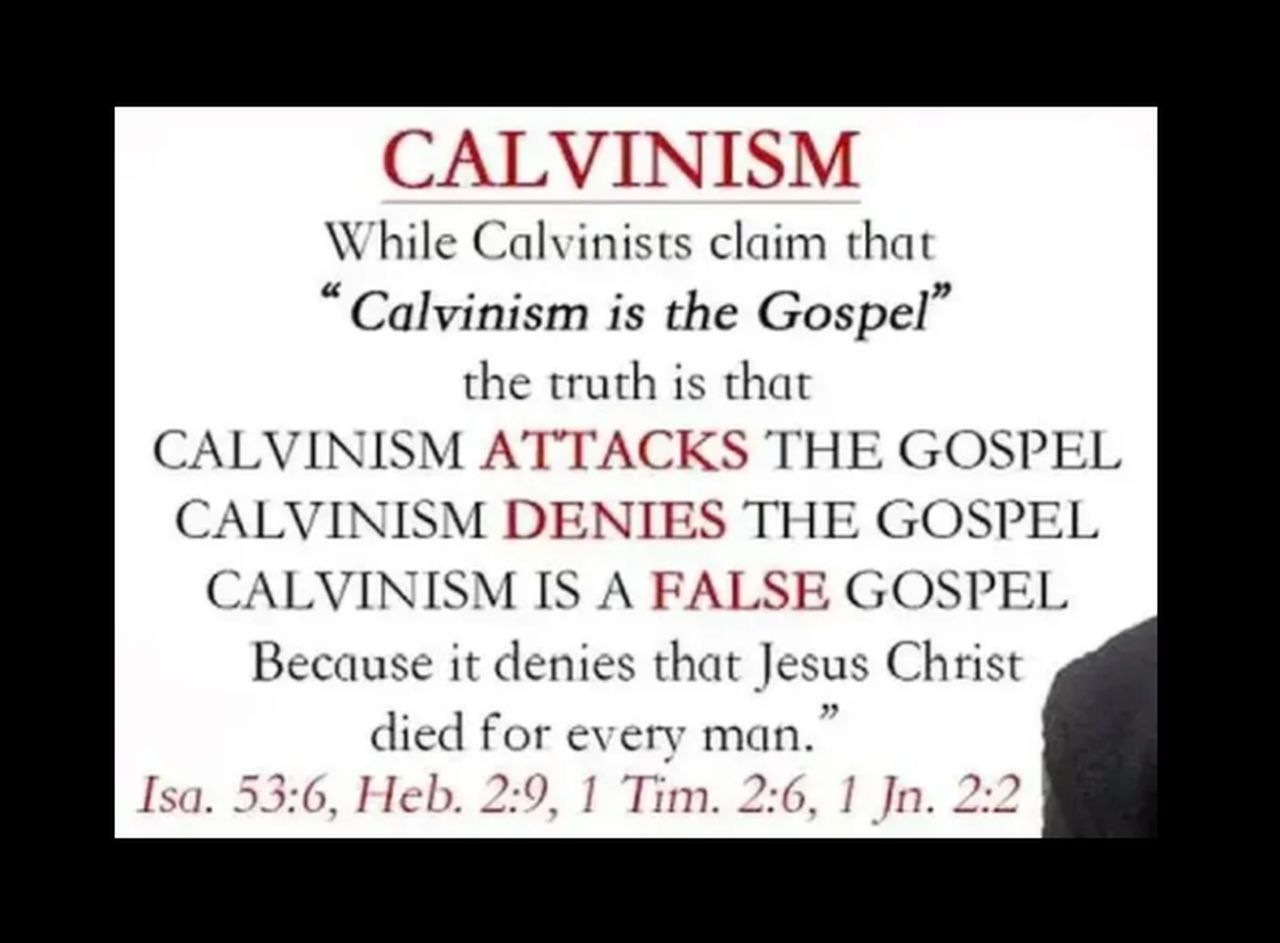
Calvinists Define their Un-biblical, Extra-biblical Belief System with the Acrostic TULIP:
T – Total Depravity
U – Unconditional Election
L – Limited Atonement
I – Irresistible Grace
P – Perseverance of the Saints
Romans 2:11 and 1 John 2:2 immediately prove that all of Calvinism is demonic heresy. ANY fraud who is teaching calvinism is “accursed.” (Galatians 1:6-9)
 Calvinists falsely teach that Jesus only died for a certain elect few people. But God’s Word says – “And he is the propitiation for our sins: and not for ours only, but also for the sins of the whole world.” (1 John 2:2)
Calvinists falsely teach that Jesus only died for a certain elect few people. But God’s Word says – “And he is the propitiation for our sins: and not for ours only, but also for the sins of the whole world.” (1 John 2:2)
The Calvinist’s nightmare Bible verse is 1 John 2:2. I’ve literally seen devils/demons manifest when quoting this Scripture verse to calvinists. “Doctrines of devils” such as calvinism come from “seducing spirits.” (1 Timothy 4:1-2)
John Calvin was a demon-possessed philosopher who wrote volumes of heresy with little Scripture. He lives today through his writings and tells gullible men what the Bible says. They’d rather read Calvin’s doctrines of devils which contradict Scripture rather than seek the LORD for themselves in His Word, allowing the Almighty to speak for Himself (2 Timothy 2:15; 3:15-17). As an example of his bearing false witness against the LORD, John Calvin wrote:
“…salvation is freely offered to some while others are barred from access to it.” (John Calvin, Institutes of Christian Religion, Book 3, Chapter 21, Paragraph 5)
Make no mistake, the words above are the words of a demon, a devil, Satan. Jesus says Satan has come “to steal, to kill, and to destroy” but that He, our Savior Jesus, came “that they might have life, and that they might have it more abundantly.” (John 10:10) Satan seeks to steal the hope and the eternal souls of as many as who would believe his lies.
Heretics act as if they can skip over and ignore volumes of Bible verses that contradict OSAS and Calvinism and not have to give account to God in the end. Delusional (2 Thessalonians 2:9-12).
Calvinism is demonic and so is the heresy of eternal security.
Calvinism teaches that God wills, has foreordained to damn individuals. John Calvin taught that the fall of man was God’s will.
“I admit that in this miserable condition wherein men are now bound, all of Adam’s children have fallen by God’s will.” (John Calvin, Institutes of Christian Religion, Book 3, Chapter 23, Paragraph 4)
To the contrary, God says sin is man’s fault, not His:
“Let no man say when he is tempted, I am tempted of God: for God cannot be tempted with evil, neither tempteth he any man: 14 But every man is tempted, when he is drawn away of his own lust, and enticed. 15 Then when lust hath conceived, it bringeth forth sin: and sin, when it is finished, bringeth forth death.” James 1:13-15
“With Augustine (a roman catholic heretic!) I say: the Lord has created those whom he unquestionably foreknew would go to destruction. This has happened because he has willed.” (John Calvin, Institutes of Christian Religion, Book 3, Chapter 23, Paragraph 5)
To the contrary, Jesus told us that it is SATAN who has come “to steal, to kill, and to destroy” and that Jesus came to give us “life…more abundantly” and “that he might destroy the works of the devil.” (John 10:10; 1 John 3:8).
“The thief (Satan) cometh not, but for to steal, and to kill, and to destroy: I am come that they might have life, and that they might have it more abundantly.” John 10:10
“I HATE this false teaching! What would God be ‘longsuffering’ for if people were created for demise.” Antonio O’Neal
Notice what the Holy Spirit told us through the apostle John:
“He that committeth sin is of the devil; for the devil sinneth from the beginning. For this purpose the Son of God was manifested, that he might destroy the works of the devil.” 1 John 3:8
That verse didn’t say that Satan made anyone sin nor that God ordained it. Clearly inferred is that man chooses to sin – “He that committeth sin.” Because some men choose to live in sin instead of for the LORD, they are “of the devil.” ….. “the Son of God was manifested, that he might destroy the works of the devil.”
Jesus taught that “MEN loved darkness rather than light, because THEIR (own) deeds were evil (not His!).” (John 3:19-21)
“And this is the condemnation, that light is come into the world, and men loved darkness rather than light, because their deeds were evil.” John 3:19
Calvinists blasphemously attribute evil and sin to the LORD who is “Holy, holy, holy.” (Isaiah 6:3; Revelation 4:8) They love to use Isaiah 45:7 out of context.
“I form the light, and create darkness: I make peace, and create evil: I the LORD do all these things.” Isaiah 45:7
God only creates evil if you will in the sense that HE allows all to choose good or evil, darkness or light (John 3:19-21). This can be in the same sense as He spoke of in Deuteronomy 30:19-20 where He told His people that He sets before them “life and death, blessing and cursing.”
“I call heaven and earth to record this day against you, that I have set before you life and death, blessing and cursing: therefore choose life, that both thou and thy seed may live:” Deuteronomy 30:19
Typically, calvinists purposely refuse to look at the full counsel of God’s Word and hyper interpret, over emphasize, go to seed on 1 verse here and there, while ignoring the whole counsel of Scripture, as they are hell bent on promulgating certain heretical misinterpretations.
1 John 2:2 alone disproves the whole grace-perverting extra-biblical system of calvinism. “THE SINS OF THE WHOLE WORLD” is a death nail to the diabolical scam called calvinism.
WHY did Jesus tell us He was going to “draw ALL men” to Himself if He had no desire to save “ALL men”? (John 12:32)
Cursed Calvinism: Jesus promised He was going to “draw ALL men” to Himself when He went to the cross (John 12:32). God would never draw someone He didn’t desire to save – and Jesus told us that “ALLLL” men were going to be drawn to Him to be saved. Calvinist is a gross perversion of the original Gospel and character of Christ! It’s a false gospel and anyone preaching it is “accursed.” (Galatians 1:6-9)
WHY did Jesus say He was going to “draw ALL men” to Himself if He had no intention of saving them? John 12:32
How is it that you deny that Jesus “is the propitiation (atoning sacrifice) for our sins: and not for ours only, but also for the sins of THE WHOLE WORLD”? (1 John 2:2)
Calvinists love to misread Romans 9-11. They reject the knowledge of God here where it is once again revealed, as is repeatedly the case, that God desires to “have mercy on ALLLLLL.”
“For God hath concluded them all in unbelief, that he might have mercy upon ALL.” Romans 11:32
“All we like sheep have gone astray; we have turned every one to his own way; and the LORD hath laid on him the iniquity of us ALL.” Isaiah 53:6
Jesus died to save “EVERY man.”
“But we see Jesus, who was made a little lower than the angels for the suffering of death, crowned with glory and honour; that he by the grace of God should taste death FOR EVERY MAN.” Hebrews 2:9
Calvinism is an antichrist cult….There are more than one proof of this, including that they learn from mere men, they indoctrinate their prey, and they uphold the doctrines of sinful men (reformers) above God’s Word.
“Let God be true, but every man a liar…” Romans 3:4
What did God give us to know His “doctrine”?
“All scripture is given by inspiration of God, and is profitable for doctrine, for reproof, for correction, for instruction in righteousness: 17 That the man of God may be perfect, throughly furnished unto all good works.” 2 Timothy 3:16-17
Cults are known in that they have a faulty foundation – they rest on something other than God’s Word and are therefore built on sinking sound (Matthew 7:15-29).
The calvinist seeks to see the Bible through calvinism instead of seeing calvinism through the Bible.
Like the pharisees of Jesus’ day, most calvinists are more intent upon holding to a heretical tradition than to the Word of God (Mark 7:6-10).
“Calvinism comes from Gnostic, Greek philosophy that Augustine learned and mixed in with Christianity.” unknown (Calvin repeatedly admitted that he got his doctrines from Augustine. Augustine was a catholic
“Who will have ALLLLL men to be saved, and to come unto the knowledge of the truth.” 1 Timothy 2:4
John Calvin admittedly revealed that he was getting his doctrines from the Catholic Augustine (a total fraud). All of Catholicism, from its very inception, was Antichrist. Therefore anything coming out of it is cursed. It is a cursed tree which cannot bear good fruit.
Calvinism is a twisted, demonic system of heresies that grossly malign the character and Gospel of Jesus Christ. 1 verse destroys the false foundation upon which the heretical system of calvinism is built. 1 John 2:2 case closed.
MESSAGE RECEIVED:
“Attacking Calvinism isn’t loving your neighbor. You are neglecting Ephesians 1:4. Calvinism is biblical. If you want a target of false doctrine to focus on, the Prosperity Gospel is a huge one. The Bible must be read in context.”
REPLY:
Since Calvinism is pure demonic heresy, attacking Calvinism is attacking and exposing satan which is the mandate of God to all who know Him.
“Beloved, when I gave all diligence to write unto you of the common salvation, it was needful for me to write unto you, and exhort you that ye should earnestly contend for the faith which was once delivered unto the saints.” Jude 3
You only defend this system, this “doctrine of devils” due to not studying God’s Word for yourself and instead, following Satan’s wolves.
Loving the LORD is more important than loving your neighbor and when you love the LORD you don’t following heresies.
1 John 2:2 alone slays the demonic system of Calvinism. Case closed.
Repent and follow Jesus, not wolves who are His enemies.
History of Calvinism – Rooted in Catholicism and Murder | DOES Mankind Have Free Will?
One disciple writes: “The Calvinists act like these devils (their idolized reformers like Calvin) invented the Bible itself when they were born 1500 to 1600 years later. These rats were the worst people like Calvin, John Knox, Luther and another rat named Huldrych Zwingli who murdered the real reformers—like the Anabaptists and other sects—by the tens of thousands and were evil satanic tyrants. They raped and tortured their way to power. If you do not believe me look up the persecution and murder of the Anabaptists, along with reformation leaders who tortured and killed dissidents with the numbers into the hundreds of thousands. Look it up because the great truth is these snakes were so evil and arrogant with their fake self-righteous holiness that they wrote it all down for all to read. Evil people. Even today people will tell me they purely made up the story of Jew-hater Luther and the ink well. All made up 100 years later and the original story was of a fight between him and a monk over a prostitute. Just saying there are tons of myths from the so-called Church fathers. Some of them where wicked and insane. Don’t believe me, look it up. But don’t go to the reformed historians because they lie though their teeth. Even Catholic historians tell more truth about the horrors of the burning times. Go to secular sources who tell it like it was. Years ago, when I used to preach on this topic, I got more death threats from reformers than Muslims because they serve their fake reformed gods above Bible truth.”
More on Eternal Security/OSAS



Apostasy
Eternal Security / OSAS DEVILS Slammed! 1 John 2:19 [podcast]

THE DEVIL IS A LIAR: Another “eternal security” proof text plundered!
1 John 2:19
“They went out from us, but they were not of us; for if they had been of us, they would no doubt have continued with us: but they went out, that they might be made manifest that they were not all of us.” 1 John 2:19
 Interestingly, the word “never” does not appear in this verse above which is so often used to “prove” OSAS. Let’s read it again with an objective mind. And, also remember what Jesus says about the primary importance of His teaching of the seed and the soil, the sower and the Word:
Interestingly, the word “never” does not appear in this verse above which is so often used to “prove” OSAS. Let’s read it again with an objective mind. And, also remember what Jesus says about the primary importance of His teaching of the seed and the soil, the sower and the Word:
“And he said unto them, Know ye not this parable? and how then will ye know all parables?” Mark 4:13
The honest student of the whole Counsel of God’s Word knows that numerous clear Bible truths reveal that a saved person can turn away from the LORD, so we know that the apostle John could not possibly be saying that a saved person could never depart from the LORD. In my opinion, this verse is the best argument the eternal security proponent has, yet it’s not enough. There must be two or three witnesses and not just one (2 Cor. 13:1). After a closer examination of this text, one will find that verse 19 does not teach or justify “once saved always saved.” When any one verse is taken to the exclusion of the whole Word of God, one will certainly misunderstand the doctrine of the LORD which can only be apprehended by “study.” (2 Tim. 2:15) This verse is like any other verse of Scripture – it must be taken in light of the entire Counsel of God. The context to be considered is 1 John 2:18-29).
In examining the context in which 1 John 2:19 is set, we see that false teachers whom John calls “many antichrists,” had come and were telling these believers that Jesus was not the Christ (v22).
Let’s look at verses 18 and 19 together:
“Little children, it is the last time: and as ye have heard that antichrist shall come, even now are there many antichrists; whereby we know that it is the last time. They went out from us, but they were not of us; for if they had been of us, they would no doubt have continued with us: but they went out, that they might be made manifest that they were not all of us.” 1 John 2:18-19
Note here that it is specifically of these “antichrists” that John speaks and says that “if they had been of us, they would no doubt have continued with us: but they went out, that they might be made manifest that they were not all of us.”
John was speaking of those who were once saved but then departed from the faith (1 Tim 4:1), they believed and then fell away (Luke 8:12-13) …. then departed from the believers in that fellowship.
Teddy Caldwell writes:
“OSAS insists that those are professing believers, but 1 John 2:18 says such people are antichrists. 1 John 2:22 says an antichrist is one who denies that Jesus is the Christ. Anyone who does that isn’t a believer and isn’t even trying to look like one.”
Concerning 1 John 2:19, Donald Stamps, in the Life in the Spirit Study Bible, writes:
“‘THEY WENT OUT FROM US.’ When the antichrists departed from their fellowship with true believers, they were not in a saving relationship with Christ. This allows for two possibilities: (1) They were never true believers to begin with, or (2) they had once been in a saving relationship with Christ but afterward abandoned their faith in Christ.”
Right here in verse 24 of this passage we see the doctrine of personal responsibility to “remain” in faithful obedience to the LORD or lose one’s place with God (1 Cor. 15:2; Gal. 6:9; Col. 1:23). This is a teaching found throughout Holy Writ – the divine requirement to stay saved or lose all in eternity, “suffering the vengeance of eternal fire.” (Jude 7)
“Let that therefore abide (remain) in you, which ye have heard from the beginning. IF (denotes condition) that which ye have heard from the beginning shall remain in you, ye also shall continue in the Son, and in the Father. And this is the promise that he hath promised us, even eternal life.” 1 John 2:24-25
Verse 24 alone tells us that we cannot think that verse 19 means that someone who is at some point in right standing with God can never depart from Him and lose out. Also, verse 25 tells us that “eternal life” (not just rewards) is at stake and the promise contingent upon the believer abiding or remaining in that “which ye have heard from the beginning” which is the Gospel. “Eternal life” is assured as long as one is remaining rooted in Jesus Christ. This is the overwhelmingly consistent message of God’s Word.
In verse 26 John says “These things have I written unto you concerning them that seduce you.” Verse 19 is written about the deceivers who sought to “seduce” these disciples John was addressing and not of true believers.
With all of Scripture in consideration, we can conclude that 1 John 2:19 is a specific example and not a rule of doctrine.
If you truly wish to search out this matter, let me encourage you to closely examine, break down and study this entire text (1 Jn. 2:18-29). In order to ascertain truth, one must compare the verse in question with all other related Scriptures, beginning with the context in which the verse is set (Isa. 28:9-10; 1 Cor. 2:13).
Excerpt from the book Lie of the Ages
Which Came First? Faith or Regeneration | Eternal Security/OSAS Busted and Exposed
Support | STORE | Podcasts | More on Assurance here | Eternal Security Debunked | The Cross Life | 100’s of Christ-centered, Scripture-rich podcasts for your edification in Christ.



Abiding
Can a Born Again Man be Un-Born Again? [podcast]

This is the question asked by those who do not like what the Word of God clearly reveals. They do not like God’s answer…. they do not like that they are personally accountable and will be judged for every thought, word, and deed in this life.
Can a born again man be then unborn again?
Can a born man die physically? All do and so obviously a born again man (spiritually) can be unborn again – can die spirit by sin (Ezekiel 18:4; Romans 6:23).
“My little children, of whom I travail in birth AGAIN until Christ be formed in you,” Galatians 4:19
Biblical question: Can a dog return to his own vomit? Yes. In other words, can a sinner return back to his own sin – backslide?
“For if AFTER they have escaped the pollutions of the world through the knowledge of the Lord and Saviour Jesus Christ, they are AGAIN entangled therein, and overcome, the latter end is worse with them than the beginning. 21 For it had been better for them not to have known the way of righteousness, than, AFTER they have known it, to turn from the holy commandment delivered unto them. 22 But it is happened unto them according to the true proverb, The dog is turned to his own vomit AGAIN; and the sow that was washed to her wallowing in the mire.” 2 Peter 2:20-22
If their judgment is going to be worse for returning, how is it that they had only a mere head knowledge?
If they had a mere head knowledge, how could they possibly have “escaped the pollutions of the world”?
Many of God’s people were delivered out of Egypt (salvation) and then perished for their sins – being forbidden from entering in the promised land (Heaven). See 1 Corinthians 10:1-12.
“But avoid foolish questions, and genealogies, and contentions, and strivings about the law; for they are unprofitable and vain. 10 A man that is an heretick after the first and second admonition reject; 11 Knowing that he that is such is subverted, and sinneth, being condemned of himself.” Titus 3:9-11
“These are spots in your feasts of charity, when they feast with you, feeding themselves without fear: CLOUDS THEY ARE WITHOUT WATER (contain little or no divine substance), carried about of winds; trees whose fruit withereth, without fruit, twice dead, plucked up by the roots;” Jude 12
Being “Cut off” will happen to all who do not continue in the LORD on HIS terms.
“Well; because of unbelief they (the Jews, God’s people) were broken off, and thou standest by faith. Be not highminded, but fear: 21 For if God spared not the natural branches, take heed lest he also spare not thee. 22 Behold therefore the goodness and severity of God: on them which fell, severity; but toward thee, goodness, IF thou continue in his goodness: otherwise thou also shalt be cut off.” Romans 11:20-22
IF you leave the LORD, HE’s leaving you…. let’s get a clue. You are personally responsible to be saved and to “abide” which simply means to continue, to remain rooted and grounded in Christ (John 15:1-6, etc.). If not, you will be cast into the fire (John 15:6). Every person peddling the once saved always saved/eternal security heresy is incontrovertibly an “ungodly” man, an agent of Satan himself (Genesis 2:17; 3:4; Jude 4, etc.).
“If a man abide not in me, he is cast forth as a branch, and is withered; and men gather them, and cast them into the fire, and they are burned.” John 15:6
They disrespect the holiness of God and grossly underestimate the power of sin against the holiness of God.
“That’s the dangers when you attend a church that teaches the false doctrine of ETERNAL SECURITY. You are Eternally secured, if your walk with Jesus, and you don’t have any secret practicing sin. But if backslide back into Sin, Salvation is lost. You have to do your 1st works over. Repentance, receive Jesus and walk faithfully with him and turn and resist sin.” Terrence Przybylski
SIN SEPARATES – SO WE MUST HONESTLY CONFESS IT IN REPENTANCE AND FORSAKE IT (Proverbs 28:13)
“But your iniquities (sins) have separated between you and your God, and your sins have hid his face from you, that he will not hear.” ~ Isaiah 59:2
It’s only “IF” we confess our sins that God is going to “forgive us our sins.” Disprove it! “If” denotes condition.
“IFFFF we confess our sins, he is faithful and just to forgive us our sins, and to cleanse us from all unrighteousness.” 1 John 1:9
After being saved, the recipient of that salvation must repent as needed and confess sin in order to have sin forgiven. The LORD decided this and we just read it. To obey or disobey is the God-giving choice of the individual (Joshua 24:15). Obedience leads to life and disobedience leads to death.
“Know ye not, that to whom ye yield yourselves servants to obey, his servants ye are to whom ye obey; whether of sin unto death, or of obedience unto righteousness?” Romans 6:16
WHY did Jesus come and die on the cross? How much sin does the LORD require that we be purified from?
“Who gave himself for us, that he might redeem us from ALLLL iniquity, and purify unto himself a peculiar people, zealous of good works.” Titus 2:14
How much sin does God expect and command us to “cleanse ourselves from”?:
“Having therefore these promises, dearly beloved, let us cleanse ourselves from ALLLL filthiness of the flesh and spirit, perfecting holiness in the fear of God.” 2 Corinthians 7:1
“A real encounter, a real relationship with the only true and living God causes your heart to repent and change your ways and confess all sin.” Meme A.
These heretics think that you’re obligated to answer their evil intended questions and will call you names like “coward” if you don’t. Was Jesus a coward for not answering the questions of the enemies, the pharisees or for answering their questions with questions? No. He saw right through their sham. Again, their whole mode of operation is to block the truth, to deny it, to evade it. Why? Because they are the moral cowards who refuse to truly repent, lay down their lives in this fleeting world, deny self, take up the cross, and follow Jesus for real.
If Adam and Eve had only lost their fellowship with God and not their relationship, WHY did Jesus have to come to the earth and die a horrible death to bring mankind back?
The evil intent of those who divert from the very words of God tells you exactly who they really are. They are the modern pharisees who….
“He answered and said unto them, Well hath Esaias prophesied of you hypocrites, as it is written, This people honoureth me with their lips, but their heart is far from me. 7 Howbeit in vain do they worship me, teaching for doctrines the commandments of men. 8 For laying aside the commandment of God, ye hold the tradition of men, as the washing of pots and cups: and many other such like things ye do. 9 And he said unto them, Full well ye reject the commandment of God, that ye may keep your own tradition.” Mark 7:6-9
Notice that they “reject” the Word of God. They demote it, they “reject” it and put it lower than their heretical “tradition.” They don’t want God’s answer because they are not submitted to Him. They’ve made up a god in their own image that panders to their own sinful whims, allowing them to live as they wish and not has He has commanded and requires (Matthew 3:7-10; 1 Peter 1:15-16, etc.). …. they are not interested in what the whole testimony of Scripture communicates. Instead, they ignore Holy Scriptures that directly confront the lie they believe and close their ears to that divine truth…. because they are not in this for God, to serve God but rather self (Read John 8).
Regrettably, their goal is not to apprehend and know the truth of God but rather to defend their own position. They have made up their evil minds and nothing going to change it and they will “perish in their own corruption.” Of these false teachers, God’s Word says:
“But these, as natural brute beasts, made to be taken and destroyed, speak evil of the things that they understand not; and shall utterly perish in their own corruption;” 2 Peter 2:12
Those who balk at and ignore that Jesus says you MUST “endure to the end” to be “saved” into eternal glory, simply do not love Him (Matthew 10:22; 24:13, etc.). Jesus is not worth their life. They were worth His life which He gave for them on the cross, yet the Son of God is not worth giving up their own life in this fleeting world. Counterfeits. These are the frauds who hide behind the eternal security sham.
“So likewise, whosoever he be of you that forsaketh not all that he hath, he cannot be my disciple.” Luke 14:33
Recently I had a calvinist ask me with evil intent this question. When you hear this question from heretics it’s simply because they do not like God’s answer to this question and are smoke screening or trying to cloud the issue with evil intended questions no different than when Trump’s press secretary was bombarded with questions by people of evil intent. They are not interested in what God’s Word really says and seek to interrupt the flow of the very Word of God by introducing questions in an attempt to sidetrack their opponent. This is clearly a tactic, a scheme of the enemy himself. Jesus says:
“He that is OF GOD heareth God’s words: ye therefore hear them not, because ye are NOT OF GOD.” John 8:47
We must ask ourselves the hard questions. Are we really “FREE INDEED” or are we in bondage to sin? Are we servants to sin?
“Jesus answered them, Verily, verily, I say unto you, Whosoever committeth sin is the servant of sin. 35 And the servant abideth (remains) not in the house for ever (not guaranteed un-conditional eternal salvation): but the Son abideth ever. 36 If the Son therefore shall make you free, ye shall be free indeed.” John 8:34-36
“And every man that hath this hope (the return of Christ) in him purifieth himself, even as he is pure. 4 Whosoever committeth sin transgresseth also the law: for sin is the transgression of the law. 5 And ye know that he was manifested to take away our sins; and in him is no sin. 6 Whosoever abideth in him sinneth not: whosoever sinneth hath not seen him, neither known him. 7 Little children, let no man deceive you: he that doeth righteousness is righteous, even as he is righteous. 8 He that committeth sin is of the devil; for the devil sinneth from the beginning. For this purpose the Son of God was manifested, that he might destroy the works of the devil. 9 Whosoever is born of God doth not commit sin; for his seed remaineth in him: and he cannot sin, because he is born of God. 10 In this the children of God are manifest, and the children of the devil: whosoever doeth not righteousness is not of God, neither he that loveth not his brother.” 1 John 3:3-10
John Wesley slays the doctrine of devils called “eternal security” or “once saved always saved,” or “perseverance of the saints.”
John Wesley on Calvinism, Once Saved Always Saved, and Conditional Security
“Calvinists, who deny that salvation can ever be lost, reason on the subject in a marvelous way. They tell us, that no virgin’s lamp can go out; no promising harvest be choked with thorns; no branch in Christ can ever be cut off from unfruitfulness; no pardon can ever be forfeited, and no name blotted out of God’s book! They insist that no salt can ever lose its savor; nobody can ever ‘receive the grace of God in vain’; ‘bury his talents’; ‘neglect such great salvation’; trifle away ‘a day of grace’; ‘look back’ after putting his hand to the gospel plow. Nobody can ‘grieve the Spirit’ till He is ‘quenched,’ and strives no more, nor ‘deny the Lord that bought them’; nor ‘bring upon themselves swift destruction.’ Nobody, or body of believers, can ever get so lukewarm that Jesus will spew them out of His mouth. They use reams of paper to argue that if one ever got lost he was never found (John 17:12); that if one falls, he never stood (Rom. 11:16-22 and Heb. 6:4-6); if one was ever ‘cast forth,’ he was never in, and ‘if one ever withered,’ he was never green (John 15:1-6); and that ‘if any man draws back,’ it proves that he never had anything to draw back from (Heb. 10:38,39); that if one ever ‘falls away into spiritual darkness,’ he was never enlightened (Heb 6:4-6); that if you ‘again get entangled in the pollutions of the world,’ it shows that you never escaped (2 Pet 2:20); that if you ‘put salvation away’ you never had it to put away, and if you make shipwreck of faith, there was no ship of faith there!! In short they say: If you get it, you can’t lose it; and if you lose it you never had it. May God save us from accepting a doctrine, that must be defended by such fallacious reasoning!” ~ John Wesley
OSAS people make a vain attempt at redefining the words of Scripture to fit their own self-serving agenda of lukewarmness, cross-less rebellion. For example they hyper-focus on “eternal” in the term “eternal life” while intentionally refusing to synthesize the whole of what Scripture states. Purposely, they do not distinguish between initial and final salvation and refuse to believe that after being saved, the recipient of His salvation must “endure to the end” to be “saved.” (Matthew 10:22; 24:13; John 15:6; Colossians 1:23; Hebrews 3:6, 12-14; 10:26-39; 2 Peter 2:20-21; Revelation 2-3, etc.) They hyper-focus on the word “gift” and teach that a gift could never be lost which the rest of Scripture does not agree with. They then take the word “sealed” and make it to be permanent which it cannot possibly be because the same Greek word for “sealed” is used of Jesus’ tomb which we all know was NOT permanently sealed – it was unsealed when Jesus came out of that grave! (Matthew 27:66) In this they bear false witness against the LORD and act like some Scriptures are more divinely inspired than others. This practice reveals the evil and deceit of their own hearts. While they scream, “context, context, context,” they themselves syphon things out of the immediate and overall context of Scripture. Not just some Scripture in the Bible but rather “ALL scripture is given by inspiration of God…” (2 Timothy 3:16-17) It must all be synthesized, put together, compared (1 Corinthians 2:13). Error will result in the hearts and lives of those who do not search, study, and revere “ALL scripture” in God’s Word.
The Cancer of Calvinism | Eternal Security/OSAS is a Scam
Support | STORE | Podcasts | Christology | Eternal Security/OSAS | Calvinism Exposed | The Sovereignty of God as Defined by Calvinism [podcast] | John Wesley on Calvinism Once Saved Aways Saved and Conditional Security | Lie of the Ages (Blockbuster book exposing OSAS and calvinism)

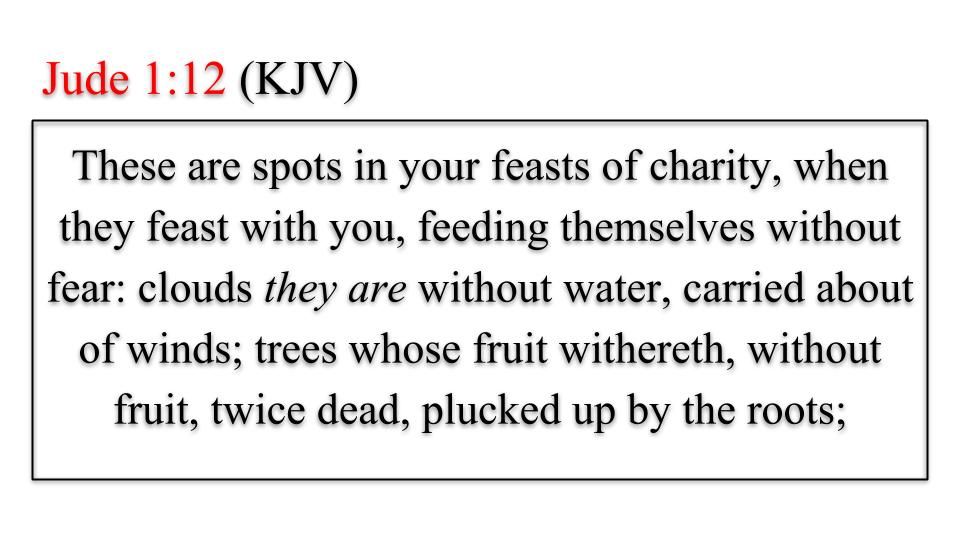


 America11 months ago
America11 months agoThe Drugging of America: The Pharmakeia Sorcery Deception [podcast]

 Articles2 years ago
Articles2 years agoChildren being Rescued in Tunnels: Happening Now – UPDATE!

 Articles8 years ago
Articles8 years agoSelf-Examination in Preparation for the Lord’s Return

 Apostasy2 years ago
Apostasy2 years agoSHOCKING List of False Prophets Most Believe are True











